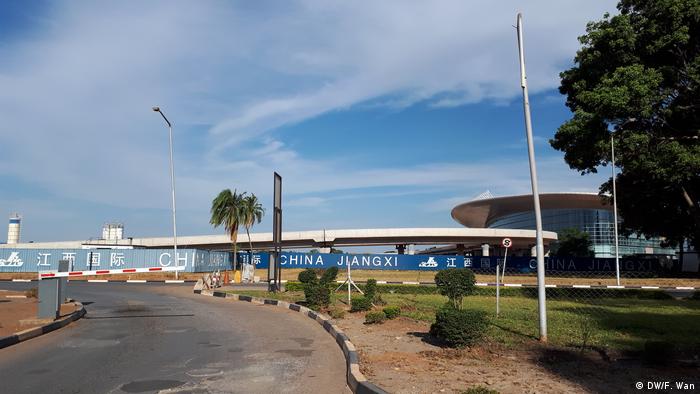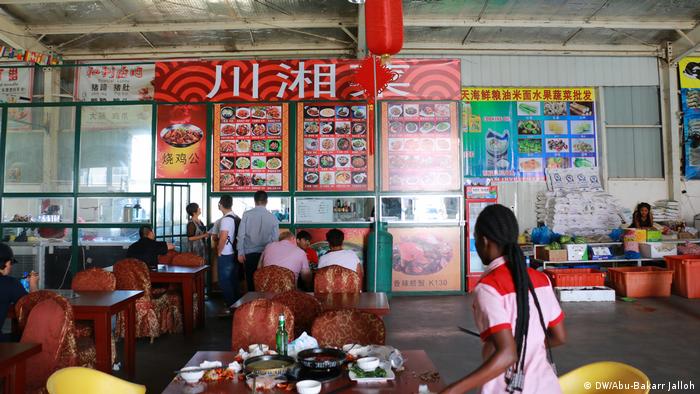Many Africans are concerned about the growing presence of China on the continent. But what role China plays, really? A DW Team traveled to Zambia to find out.

To the Kenneth Kaunda airport, Lusaka Mandarin is ubiquitous: Almost half of all passengers that flow through the buildings, speak the Chinese language. In front of the building visitors will be of huge advertising welcomes panels of the construction group, Jiangxi International. The road from the airport to the centre of the Zambian capital, is lined with many of these billboards, advertising for Chinese companies.
All this makes clear that China is Zambia’s most important business partners. And the power in spite of the growing Concerns about the increasing debt of African countries in the Asian economy.
Chinese investment in Zambia has grown in recent years, to ten times. Practically, this means that China has the Zambian economy firmly in its grip. The many agreements between Beijing and Lusaka are not easy to see through: The projects presented are neither public, nor by the relevant institutions – Parliament included.
Controversial Digitisation Projects
An example: The China-funded media migration project, which should bring the Zambian media landscape from the analog to the digital age. The project was in the headlines as the facts about the Deal came gradually to light.
First of all, the Chinese Exim Bank had made a loan of the equivalent of 243 million euros for the project. This money, the Chinese media group, star times took on behalf of Zambia, state radio ZNBC institution. Together, star, times and ZNBC formed a Joint Venture named TopStar. This company eventually gained control of two important licences: signal transmission and program design.

The new wing of the Kenneth Kaunda airport in Lusaka from China financed
“The government has informed us that ZNBC would be after the completion of the Migration responsible for the contents and TopStar for the Transfer and the technical Equipment,” explains a senior ZNBC staff in an Interview with DW. He was involved in the process, but wants to remain anonymous.
Lack of transparency, high costs
Actually, Zambia’s competition laws, each of the media houses prohibit both a Transfer than to have a program license. “Employee of ZNBC and other TV stations were shocked when they heard that TopStar would not only act for which the signal transmission should be responsible, but also as a program provider,” says the ZNBC-man.
Particularly annoying for many Zambians: After the completion of the conversion to the digital standard broadcast TopStar all Zambian Free-TV programmes only in encrypted form. Who wants to watch Zambia television, then pay a monthly fee to TopStar. Also from the local stations, the Joint Venture calls for high fees.
Critics, especially the lack of transparency at all levels of the media migration project and the high cost. According to Figures from the anti-corruption network, SANAC, the Zambian government paid for the transition from analogue to digital broadcasting, up to five Times as much as the neighboring States.
The Air Space Controversy
Another controversial project is the construction of a new glass wing at the Kenneth Kaunda airport. Again, the line of credit from the Chinese Exim Bank came, this time in the amount of 323 million euros. “In addition to the airport project, there was a second loan for the modernisation of the Zambian air force,” says an employee of the airport who wishes to remain anonymous.
A senior colleague working in the military part of the air traffic control of the airport, told him of the agreement. “It is an open secret, because everybody sees the Chinese military personnel in the control tower, belonging to the Zambian air force.”
Officially, the Chinese support the Zambian air force for the Surveillance of the airspace over Zambia, in the pilot training. However, according to the anonymous source, the Chinese should have built a separate, parallel structure at the airport. That China had absolute control over the Zambian air space, as some users suggest in social media, don’t believe the source.
How high is Zambia’s debts really are?
China’s presence in Zambia dates back to the year 1976, when the Beijing government implemented its first large project on the African continent: the tansanisch-Zambian railway (TAZARA). Zambia is proud to be able to China’s oldest friend in Africa. But, increasingly, the friendship turns into a creditor-debtor relationship. According to the Zambian government up to 30 percent of the 8.3 billion Euro abroad, go back to the debt of Zambia on Chinese loans.

A Chinese food market in the Zambian capital of Lusaka
The actual sum could be higher. The official Figures, “included no loans to semi-government bodies and guarantees of the government,” says the former Minister of information, Chishimba Kambwili. “If we expect all of the project funds and guarantees, owed by Zambia China 20.4 billion euros”. For comparison: The gross domestic product of Zambia was in 2017 to around 23 billion euros.
Kambwili was one of President Edgar Lungus closest friends and headed two ministries in the government. He was regarded as a supporter of the friendly attitude towards China until he was fired. He was then accused of wanting the President as Chairman of the ruling party “Patriotic Front” detachment.
“A Plague”
The business man and politician from the mineral-rich copper belt of the country must answer for itself now because of corruption in court. He keeps the accusations for, however politically motivated.
After his expulsion from the government Kambwili has become one of the fiercest critics of the China policy of the President. “For me, the Chinese are not investors, but a plague. For every Dollar you give, you make five dollars Profit”, so Kambiwili.
According to official government statistics, Zambia between 2011 and 2021, a total of 17.7 euros will be spend for infrastructure projects. 83 percent of these projects are funded by companies with ties to the Chinese government and implemented.
The Chinese remain
Another factor that makes many Sambiern fear: The number of Chinese coming into the country and the business can record it for you. Although only 20,000 Chinese in Zambia, according to official statistics up to date. Nevertheless, many Zambians feel overwhelmed by the presence of the Chinese.
“The Chinese have taken away from the shops operated by Locals,” says the former information Minister Kambwili. “Even the chickens and the corn roasting is done by the Chinese.”
“I would not be surprised if we have in the next three or four years, the Chinese Minister,” he says.